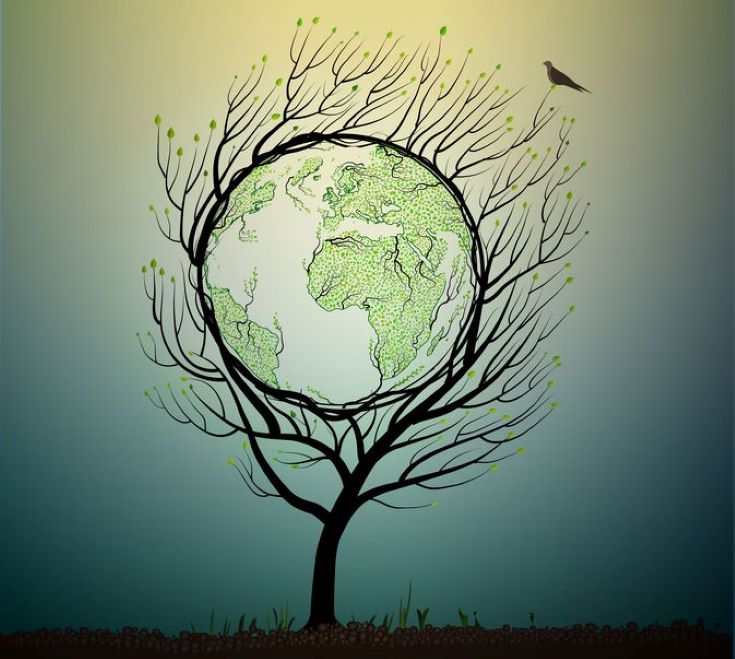Only ecology-based economies can avoid future catastrophe
Much has been made of the brief respite in carbon emissions that coronavirus has given the world. But let’s not get too excited, says Fazlun Khalid, advisor to the UN on environment and faith.

A post-Covid-19 economic shift requires incentivising the rapid growth of sustainable production instead of bans and boycotts. Image: Nadiia Forkosh/123rf
The benefits are at best temporary. In fact, they are a red herring. Once the virus subsides, a race will ensue to repair the global economy – and nations and blocs will be tempted to compromise on climate targets that took decades to put in place.
Our civilisation’s relentless breaching of ecological boundaries and destruction of habitats has made pandemics such as Covid-19 all but inevitable. As early as 2007, the World Health Organization warned that expanding urbanisation, anti-microbial resistance and climate change were creating a perfect storm that would drive up the threat from emerging infectious diseases.
If we are to avert a worst-case outcome of future pandemics and climate disaster, we need drastic action.
Faced with Covid-19’s dire economic impacts, we may wonder whether we can afford to fight this battle on two fronts. But there is no vaccine for climate change after the planet warms beyond two degrees Celsius – the ‘point of no return’.
So far, economic recovery programmes rushed through by lawmakers have been focused on a band-aid approach. That is necessary to protect the most vulnerable. But to guarantee that there is an economy to return to when we bring Covid-19 under control, we need to rebuild it on a footing that can create jobs and opportunities – and all within planetary boundaries.
In taking this approach, Western countries would find that instead of a world of competing economies where rampant protectionism drives unsustainable industrial expansion, the post-Covid-19 economy could be based on an ecological approach. We need to spur a clean industrial revolution.
This is a historic opportunity to ensure that ‘helicopter money’ is tied to real assets — helping us recover, while simultaneously averting the next great global crisis.
In some cases, this will mean leaving old industries behind. In others, it will mean transforming them. In all cases, we will need collaborative approaches to tackle the top three drivers of climate change.
Fossil fuels, agriculture and deforestation
The first priority must shift trillion-dollar fossil fuel subsidies into the renewable energy sector.
The temptation, as we have seen with President Donald Trump, may be to bail out flailing oil, gas and coal sectors as demand flattens. But how long for? Societies require a resilient energy base that can sustain jobs. That means pouring trillions into solar, wind and geothermal, as well as research and development for other exciting technologies, such as hydrogen.
Agriculture is the second biggest climate driver. While supermarket supply chains come under extraordinary strain owing to panic-buying, the immediate impact of Covid-19 on reducing farm labour puts production at risk.
Agriculture is also one of the biggest carbon emitters, with huge inputs of fossil fuels involved in manufacturing pesticides and fertiliser, plus processing, packaging and distribution.
These vulnerabilities can be overcome by transitioning to more resilient, local and urban agro-ecological farming, producing food with far less energy and water, and closer to consumers.
The third biggest driver of climate change is deforestation, linked to the soy, beef, palm oil industries and beyond.
New policies to avoid disaster
Prior to Covid-19, alarm about deforestation has translated into contradictory policies: the European Union banning palm oil for biodiesel while seeking deals to import soy and beef from South America, where production causes even greater levels of deforestation. Scientists warn that piecemeal action such as boycotts forces consumers to switch to other commodities that are far more land-intensive.
Instead of bans and boycotts, a post-Covid-19 economic shift requires incentivising the rapid growth of sustainable production.
Palm oil producer Malaysia, for instance, has introduced the world’s first government-backed mandatory regulations for 100 per cent sustainable palm oil. Such efforts should be rewarded, while deals with recalcitrant actors such as Brazil should be reconsidered.
The Covid-19 pandemic might thus spur America, Europe and Asia to find common ground on an inclusive global economic programme. South American sustainable soy would contribute to sustainable European farming. Malaysian sustainable palm oil would help fuel the EU’s clean transport revolution. The US and EU can supply these emerging markets with technology integrating clean energy with Big Data to speed the emergence of smart grids.
In taking this approach, Western countries would find that instead of a world of competing economies where rampant protectionism drives unsustainable industrial expansion, the post-Covid-19 economy could be based on an ecological approach to markets: Free and open, while guided by the ethical purpose of contributing to civic, public and green goods and services.
This article is reproduced under a Creative Commons license from SciDevNet.
Fazlun Khalid, 21/04/2020